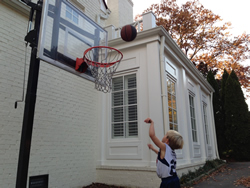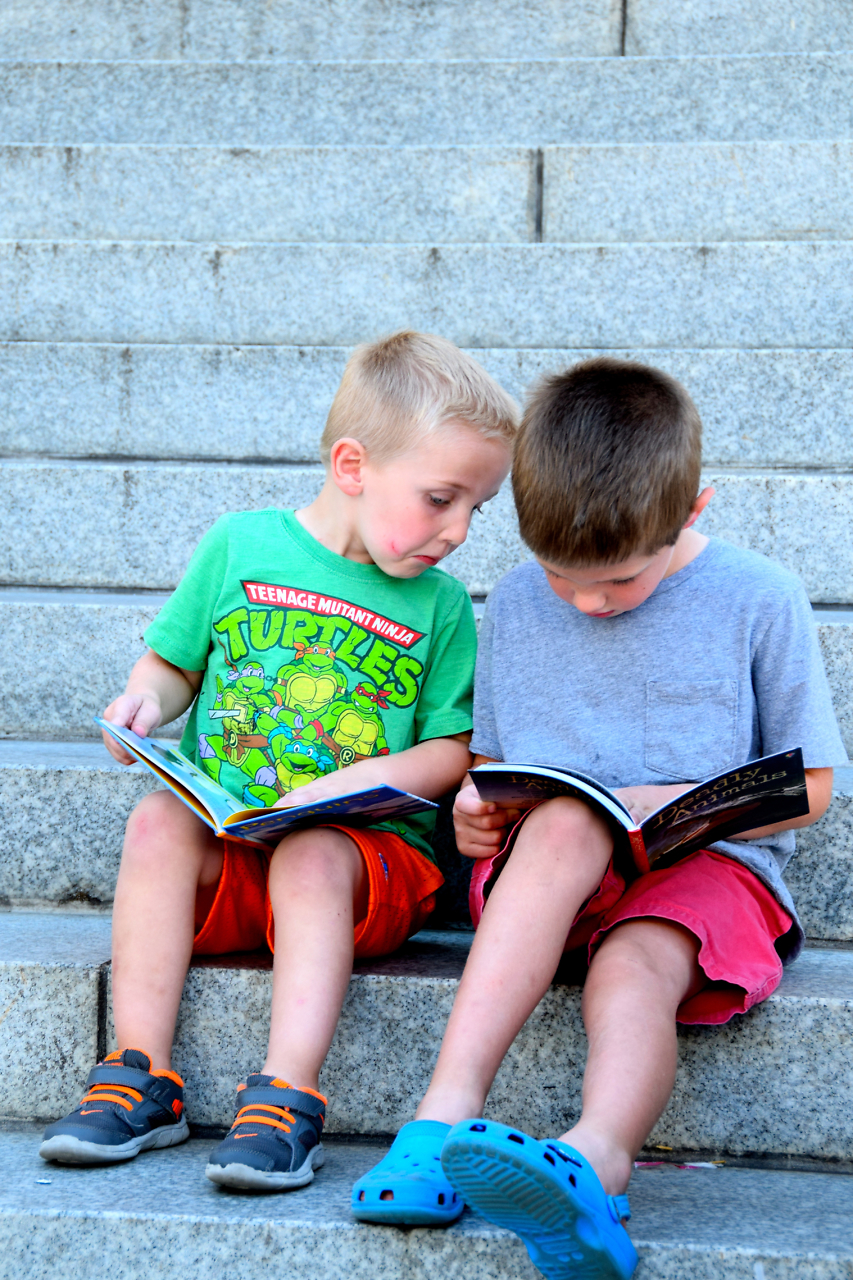Are You Visiting?
I’d never seen a mosque in the South.
I was still jetlagged on Eid-ul-Azha, digging my face into the air mattress against the invasion of light through the blinds. It was Wednesday, my third day in Nashville. I called my mother back home in Lahore.
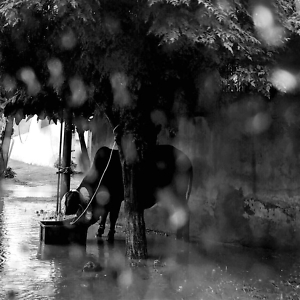 Usually when we talk, Muma retreats to her bed, away from the heated arguments on my father’s TV and the screeches from my brother’s amplifier. But that day, on account of Eid, she accepted my Facebook video request and gathered everyone in the living room. It was nighttime and pouring in Lahore, and the internet connection was weak. Pixelated segments of my family squeezed onto my laptop screen: disembodied limbs, parts of faces, lipstick on teeth, my sister’s hands patterned with henna, aging cheeks of my father.
Usually when we talk, Muma retreats to her bed, away from the heated arguments on my father’s TV and the screeches from my brother’s amplifier. But that day, on account of Eid, she accepted my Facebook video request and gathered everyone in the living room. It was nighttime and pouring in Lahore, and the internet connection was weak. Pixelated segments of my family squeezed onto my laptop screen: disembodied limbs, parts of faces, lipstick on teeth, my sister’s hands patterned with henna, aging cheeks of my father.
“Happy Hump Day,” I said.
Actually, it wasn’t even Eid in Lahore. Due to the idiosyncrasies of the Islamic calendar, Eid fell on Thursday this year in Pakistan, and my family was still preparing for the festival. My father and brother left in the middle of the conversation to drive to the goat market that springs up in the plains outside the city weeks ahead of the festival. They might get a sheep this year, my mother said, doing it the old-fashioned way. She liked the modern way—no mess, no hassle. She kept detailing dull logistics, family gossip, recounting that the housekeeper had gone back to his village, prolonging the call until I told her I needed to go.
What she didn’t say was that she missed me, that she knew I couldn’t miss her as much, that she blamed me for leaving her for four years of college, for becoming a person she sometimes couldn’t recognize, for coming back home for a year as if to fulfill some required duty, for leaving again. She’d said those things before I left. All we could debate now was: vermicelli or rice pudding for the guests? Champ or paye for dinner? Which restaurant, what color dress?
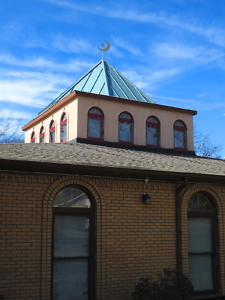 When I got off the call, I decided to wear my white shalwar kameez to commemorate the festival. What else could be done? I knew no one in the city. Following my mother’s suggestion, I browsed online to find a mosque in the area that might offer Eid prayers and discovered that the Islamic Center of Nashville had already concluded its prayers service. Whatever. I was running late for a meeting with my professor, anyway.
When I got off the call, I decided to wear my white shalwar kameez to commemorate the festival. What else could be done? I knew no one in the city. Following my mother’s suggestion, I browsed online to find a mosque in the area that might offer Eid prayers and discovered that the Islamic Center of Nashville had already concluded its prayers service. Whatever. I was running late for a meeting with my professor, anyway.
Nervous about how my outfit of the day might be read by my Green Hills neighbors, I paired it with polished leather shoes, a Costco backpack, and sunglasses, in an effort to diffuse any threat that might be perceived on its account. On my way to the bus stop, a few cars slowed down, lingering as I strode past them. I wished there were sidewalks on my street; I smoothed my kameez again and again. I practiced making my accent more American for when I’d say “Good morning” to the bus driver.
I got on the bus and found a seat in the back. A few stops later, a hijabi woman and a man stepped on board and sat together. For a brief moment, I wanted to say “Eid Mubarak!” to them. But they were huddled together, whispering. The feeling passed; I looked out the window instead. Customers, thumbing their phones, shuffled in a line snaking out of Pancake Pantry. Those better be some life-altering pancakes, I thought.
After my meeting, back at my stop, I ended up taking the wrong bus. By the time I realized my mistake, it had started to rain. I got off at the next stop and located my whereabouts; somehow I had wound up less than two miles away from the Islamic Center of Nashville. I’m not especially religious, but this seemed like a sign. I navigated my way in the drizzle under an enormous umbrella.
“Nice dress!” someone yelled from a car.
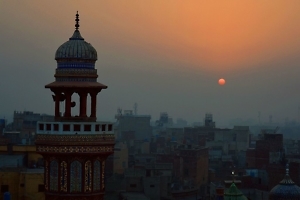
The Islamic Center of Nashville stands in the commercial heart of 12 South, one of Nashville’s most fashionable—and hence, gentrified—neighborhoods. The sun emerged when I crossed onto 12th Avenue. Men, naked except for Lycra shorts, ran ahead of me. After passing flashy condos, vintage boutiques, yoga studios, hip young bars, murals that read “I BELIEVE IN NASHVILLE” and “MAKE MUSIC NOT WAR,” and a farmer’s market, I reached the Islamic Center. Located next to a coffeehouse/bar, the Center was built on a square plan, with a high gabled roof. A small star and crescent perched up from the top like a weathervane, unconvincingly announcing the building’s identity. It looked more like a barn. Or a church.
Many signboards stood in front of the mosque, the most prominent one mentioning the structure’s name and that it was built in 1979. What had this neighborhood looked like back then? This building had stood witnessing the street get torn up for expansion, the houses sold to businessmen, the big proprietors cleaning up the area (no mess, no hassle), its old neighbors repainted in fashionable pink. The old people leave, the new ones move in.
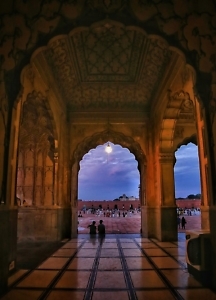
What happened to the woman who pushed the trolley next to its curb every day, the building might have wondered; what happened to the gas station? Even inside its own skeleton, it must have seen its denomination change, from almost purely African American to a slew of immigrant devotees, speaking in strange and discordant tongues. They, too, were the new people, next to the tattooed hipsters, the long-haired musicians, the men in Lycra shorts. What happened, it might have wondered, when it saw vandals approach it in the night, cans of spray paint glinting in their hands? Or maybe the guts of a slaughtered pig. Or maybe a bucket of pig shit. Or maybe a bucket of gasoline.
You’re making this up. There may never have been vandals. Maybe these are just cautionary words, I argued, all these signs: the one warning vandals, the one threatening police and security cameras, the one declaring that no firearms are allowed, and the one pleading that this was a house of God, that God taught love and peace. I’d never seen a mosque in the South. I wondered what a Muslim child must have thought earlier that day, when walking inside for Eid prayers with her family, as she spelled out these signs.
Inside, the waiting area smelled of wet plyboard. The floor was cheap linoleum. Security cameras hung from the roof like poised pistols. The walls were plastered with yet more warnings, among more banal notices of prayer and procedure, bills of belief, quotations from the Quran, advertisements for halal butchers and caterers. The main hall was locked. The offices were locked. In Pakistan, mosques are always open, an imam always present on the premises, sometimes old neighborhood men sitting inside, and sometimes boys of the madrassa reading or playing. I had convinced myself on my walk that the Center must have something going on for Eid. At least the imam would be around. I’d never seen a mosque in the South.
I stepped out of the Center. What else could’ve been done?
Outside, in front of the glittering shopfront windows of 12 South, it started raining again, and I found myself walking to the coffeeshop/bar next to the mosque.
Happy Hour at 2 .pm., the sign said. The bartender was a bearded white man, with tattoos and a beer belly. I noticed him scan my clothes; he smiled. I inquired about the three local beers that were 2-for-1 on happy hour.
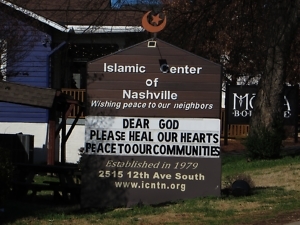 “Are you visiting?” he asked cheerily, after giving my Pakistani ID a perfunctory glance. “Or new to town?”
“Are you visiting?” he asked cheerily, after giving my Pakistani ID a perfunctory glance. “Or new to town?”
“Yeah, just got here three days ago,” I said, handing him my debit card.
“How’re you likin’ it?”
“It’s nice. Honestly, I didn’t expect it to be like this.”
“Yeah, it’s changed so much. Most people are surprised when they first come out here.” He handed me my beer. “Well, welcome to Nashville!”
“Cheers,” I said, and took my beer to a table in the corner. I felt oddly happy about the encounter with the bartender, almost self-congratulatory. Maybe I thought I had blurred for him the boundaries of whatever he assumed I was.
Ibrahim, driven mad in his dedication to Allah, slaughtered his son Ismaeel on the mountain. But when he took off his blindfold, he saw under bloody hands, the slit gullet of a ram. You’ve been punked: it was all just a test! Allah likes to test those He loves, mysterious are His ways. And because of this story, every year on the Feast of the Sacrifice—Eid-ul-Azha—Muslims around the world slaughter livestock and distribute the meat among family members, friends, and the needy.
In the coffeehouse/bar, as I opened my laptop—and just before I resumed the rhythm of routine—I remembered Muma who had held back tears when I’d Skyped her earlier that day, my mother who had sacrificed her son to the big godless world. I tried to imagine the streets of Lahore on Eid, awash with blood of butchered animals.
Chilly in my white shalwar kameez under the blast of the AC, I looked outside the bar window at the avenues of Nashville, asphalt soft with rain.
[This essay originally appeared on March 1, 2019.]
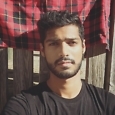 Copyright (c) 2019 by Hassaan Mirza. All rights reserved. Hassaan Mirza is a first-year M.F.A. student in fiction at Vanderbilt. Originally from Lahore, Pakistan, Hassaan graduated from Bowdoin College, where he studied English and Chinese. He serves as assistant editor of the fiction and creative nonfiction sections of the Nashville Review.
Copyright (c) 2019 by Hassaan Mirza. All rights reserved. Hassaan Mirza is a first-year M.F.A. student in fiction at Vanderbilt. Originally from Lahore, Pakistan, Hassaan graduated from Bowdoin College, where he studied English and Chinese. He serves as assistant editor of the fiction and creative nonfiction sections of the Nashville Review.
